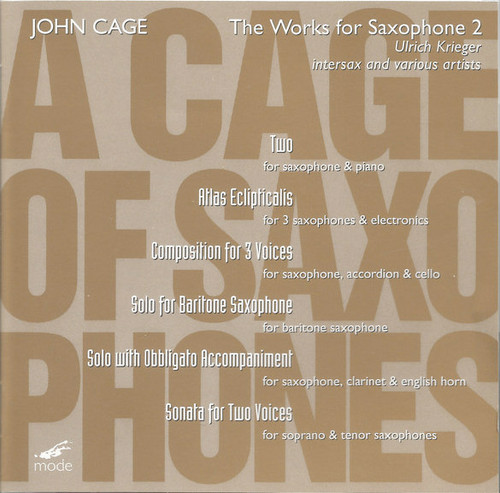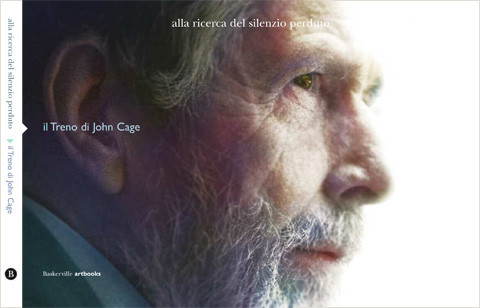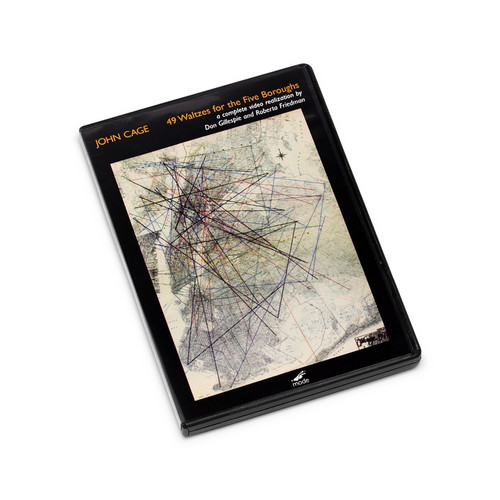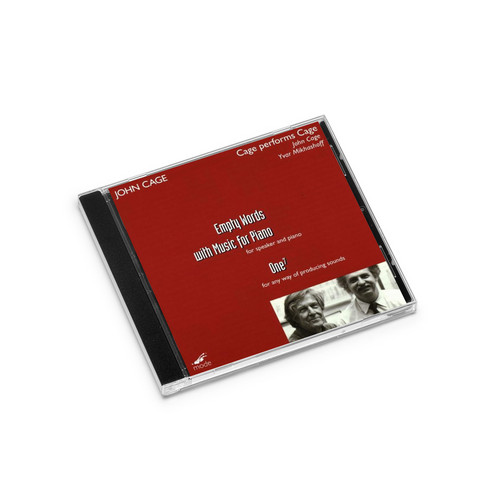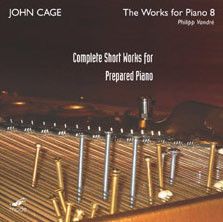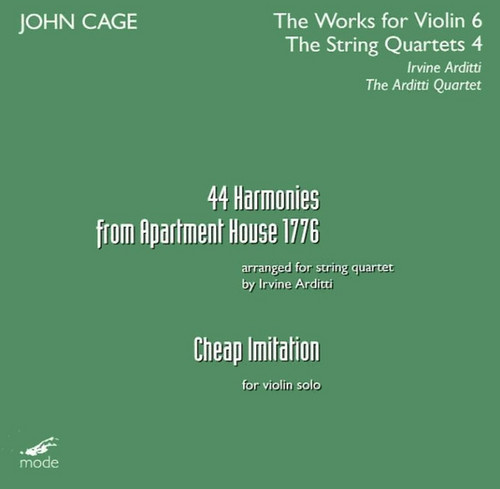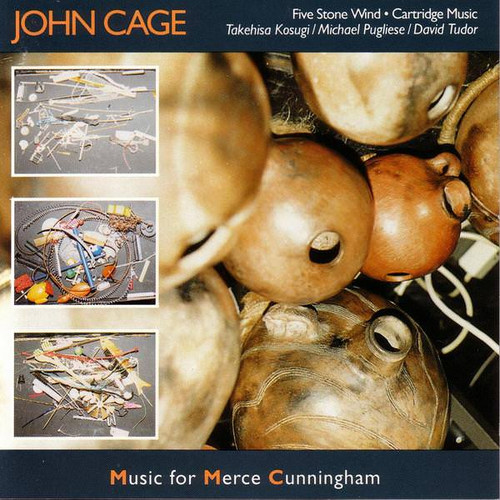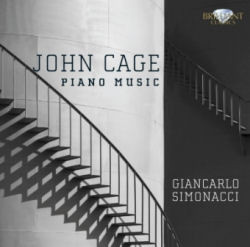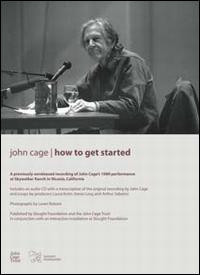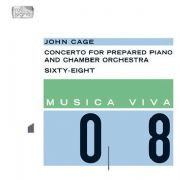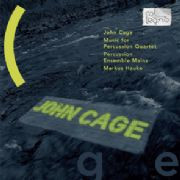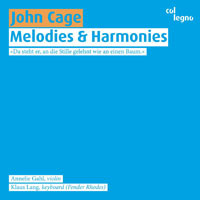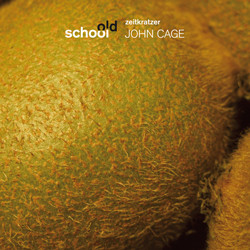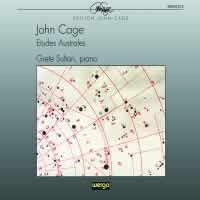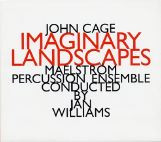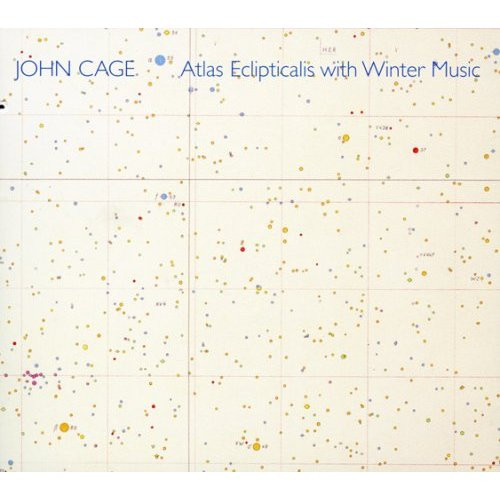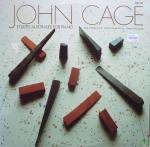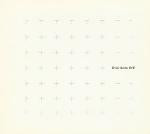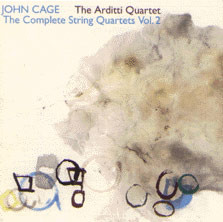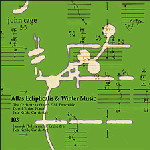JOHN CAGE begins anywhere
"John Cage begins anywhere" is an art exhibition focused on records, photographs, books, videos and visual scores by the legendary composer, held at Die Schachtel (O' art space) in Milano, in july 2011
A Cage of Saxophones 2
The 35th volume in Mode's Complete John Cage Edition is also the second release in Ulrich Krieger's series of interpretations for solo saxophone and saxophones with other instruments. Ensemble pieces of comparatively large dimensions were gathered on A Cage of Saxophones: Vol. 1, so this follow-up disc presents pieces for smaller combinations and solos, though with no less originality or charm. Even though most of these works were composed for open instrumentation, saxophones suit Cage's …
Alla ricerca del silenzio perduto - Il treno di John Cage
Included in 160-page, hardcover book with bilingual (Italian/English) 'Any and all sounds are music : the sounds that surround us, whether we are in a concert hall or not...' 'We can begin from this quote by John Cage to unearth the traces of one of the most emblematic happenings of our time. In June 1978 Cage's Train marked a watershed in musical culture. It drew a line which parted those who think of music as an artistic expression based on a tonal system (or beyond that, on any system at all)…
49 Waltzes for the Five Boroughs
A complete video realization by Don Gillespie, Roberta Friedman and Gene Caprioglio. John Cage's artwork, "49 Waltzes for the Five Boroughs", appeared in the October 6, 1977 Rolling Stone magazine - a gala issue celebrating their move to New York. He constructed his "waltzes" through chance operations as a series of 49 multi-colored triangles superimposed on the Hagstrom map of New York City. Later, he published a score for "performer(s) or listener(s) or record maker(s)" with the exact street l…
Cage Performs Cage
Empty Words (1973-74) with Music for Piano (1952-56). John Cage, voice. Yvar Mikhashoff, piano. One7 (1991) for any way of producing sounds. John cage, voice.
Mode celebrates its 200th release with a special installment in its John cage Edition - works performed by John cage himself, released for the first time. These recordings were made in Buffalo, New York in April 1991. cage and Mode Records were in Buffalo to work on the premiere of his Europera 5, which he wrote for Yvar Mikhashoff, a long…
Complete Short Works for Prepared Piano
The complete short prepared piano works collected on 2-CDs. John Cage's works for prepared piano expose his earliest experimentations in finding new and exotic sounds.Brief and attractive, they are among his most accessible work. This release marks the first time all of his short works for prepared piano have been made available in one set. All the prepared piano works are included aside from the magnum opus, Sonatas and Interludes. Pianist Philipp Vandr´e has recorded Sonatas and Interludes for…
44 Harmonies from Apartment House 1776
Cage's "44 Harmonies" were originally written to form part of the sprawling bicentennial commission "Apartment House 1776", and take as their starting point late 18th century anthems and hymn tunes by William Billings, Jacob French, Andrew Law, James Lyon and the wonderfully-named Supply Belcher. Cage's compositional - or rather decompositional - method was to remove certain tones and extend others, and as James Pritchett points out in the (excellent as always for Mode) liners, he was delighted …
Music for Merce Cunningham
2008 repress, featuring a 24-bit Hi-Definition remaster; originally released in 1991. Volume 4 in the Music of Cage series. The first audio document between John Cage & Merce Cunningham. It includes a 55-minute piece called "Five Stone Wind" performed by David Tudor (live electronics), Takehisa Kosugi (amplified violin, live electronics, bamboo flute) and Michael Pugliese (clay pots and tapes) as well as a 19-minute version of the classic "Cartridge Music" (same 3 performers, "using phonograph c…
Piano Music
JUST ARRIVED, awesome and low priced essential triple CD set with the piano compositions by John Cage (1912–92) regarded as one of the most influential and controversial composers of the 20th century. It is not only his music that this reputation is based on – his ideas were revolutionary, and he cast doubt on the supremacy of European art and music, when it was unchallenged and such views were considered heretic. Cage rejected the status held by harmony, instrumentation and even the devel…
How To Get Started
"John Cage conceived How To Get Started almost as an afterthought -- a performance substituting for another that was previously planned in 1989 for delivery at 'Sound Design: An Invitational Conference on the Uses of Sound for Radio Drama, Film, Video, Theater and Music' presented by Bay Area Radio Drama at Sprocket Systems, Skywalker Ranch, in Nicasio, California. In his introduction, Cage talks about the difficulty of initiating the creative process, while exploring the usefulness of im…
Concerto for Prepared Piano and Chamber Orchestra / Sixty-Eight
For each of his compositions for prepared piano Cage created a specific piano preparation chart, setting out in meticulous detail the strings to be prepared, and the materials and manipulations to be used for preparing them. For the Concerto for Prepared Piano and Chamber Orchestra (1951), 53 tones of the keyboard must be prepared; and in this case Cage himself was astonished at the complexity of these preparations. The range of sounds is further expanded by an extra bridge installed in the pian…
Music For Percussion Quartet
As early as in 1942, in Credo in Us, Cage employed not only a percussion ensemble but also sounds from the radio and records. Therefore, quite in accordance with what the composer would have wished, the materials used by the Percussion Ensemble Mainz in this recording range from Beethoven's fifth symphony (vinyl record, including the rustling) to ABBA, Tina Turner and advertising slogans. It goes without saying that rhythms play an important part in music for percussion. Cage, though, was also i…
Melodies & Harmonies
Cage is by no means a synonym for obligingness. All the more astonished we listen to the melodious and harmonious objects Annelie Gahl and Klaus Lang present on this album. Lang, the trained organist and internationally renowned composer, performs these pieces on a Fender Rhodes for the first time. Gahl, known as a versatile interpreter of both Old and New Music, plays the violin exactly as requested by Cage, without vibrato and with minimum weight on the bow. The musical material dates …
(Old school) John Cage
John Cage’s compositions have been part of zeitkratzer’s repertoire since the very first day. The pieces presented here justify zeitkratzer’s reputation as sound specialists. Avant-garde composer Cage is played in a conservative, precise and sensual way, apart from all philosophical ambitions, and hopefully as seductive as a Schubert quintet! The “Wire Magazine” acclaimed: zeitkratzer convinced us that Cage‘s music can still live with all its complexities, stripped of the debris of its ic…
Etudes Australes
With a score derived from star maps - the "Atlas Australis", a book of maps of stars as they can be seen from Australia - and the "I Ching" (64-choice Old-Chinese chance manual) "Etudes Australes" is a quintessentially Cageian work. Grete Sultan is an active recitalist who has performed music both classic and contemporary around the world. "When I wrote the 'Sonatas and Interludes', it was with Maro Amian in mind", Cage said. "David Tudor was in my mind when I wrote the 'Music of Changes'. Witho…
Imaginary Landscapes
Improvising guitarist Derek Bailey has expressed the belief that «If you’re going to explore uncharted territory, it’s okay to carry a compass, but not a map.» It’s obvious; if you know where you’re going and have plotted the most efficient or scenic course to get there, you may arrive without mishap but deprived of much of the drama, the danger, the unpredictable uniqueness of the journey. In the years following 1950, John Cage walked these paths of musical uncertainty, providing performers wit…
Atlas Eclipticalis With Winter Music
Featured compositions: "Atlas Eclipticalis' (1961, for chamber ensemble); "Winter Music" (1957, for 3 pianos); "Atlas Eclipitcalis" (1961, for orchestra); "Winter Music" (1957, for 20 pianos). Cage's relationship with the Cornish Institute in Seattle dates back to the 1930s, when he taught there and performed as accompanist for many dance pieces. Cornish was also the scene of several of his musical discoveries and innovations. Cage's celebrated return to the Cornish Institute in 1983 led to thes…
Etudes Australes For Piano
Etudes Australes is a set of etudes for piano solo by John Cage, composed in 1974–5 for Grete Sultan. It comprises 32 aleatoric pieces written using star charts as source material. The etudes, conceived as duets for two independent hands, are extremely difficult to play. They were followed by two more collections of similarly difficult works: Freeman Etudes for violin (1977–90) and Etudes Boreales (1978) for cello and/or piano. Only one copy available.
0°C
As the title may suggest, 0°C is a sonic exploration at a very bottom of human perception - the fragile line between life and death, dark and light, noise and silence. The authentic being is never to be achieved with complete and definitive perception of the universe - the limited human is just negligible drop somewhere between infinity and nonentity. There is no fulcrum for pretentious awareness and peace for one's arrogant mind - obscurity, uncertainty and hesitation are the only true man's sa…
Complete string quartets, volume 2
The Complete String Quartets Vol. 2. “String Quartet in Four Parts” (1949-50). “Four” (1989). The Arditti Quartet. The second volume of Cage's String Quartets features his first and last works in this repertoire. The well known and exquisitely beautiful, serenely Zen-like early quartet receives its first new recording in 16 years. It is a pivotal work in Cage's oeuvre, showing the composer's transition between the rhytmically complex percussion works before it and the chance works of the 1950s. …
Atlas eclipticalis / 103
Two live, unedited performances of Cage's orchestral music: "At last Eclipticalis With Winter Music" (recorded 5/19/93, performed by The Orchestra of the SEM Ensemble, conducted by Petr Kotick, piano by David Tudor) and "103" (recorded 11/21/98, performed by the Janacek Philharmonic Orchestra, conducted by Petr Kotik)." Kotik and Cage met for the first time in May, 1964, performing a 3-hour, six percussion version of Atlas Eclipticalis. Kotik's association with Cage continued until the composer'…
